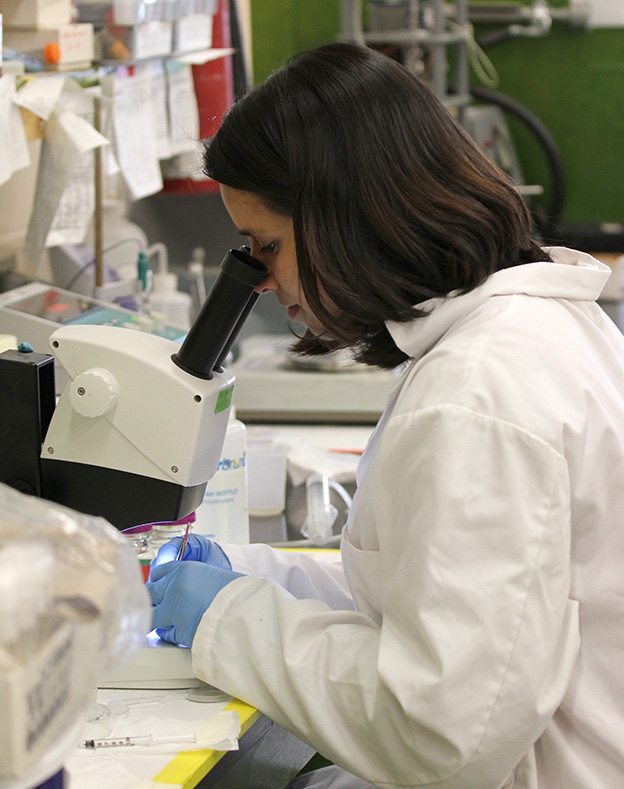Award-winning biologist searches for diabetes treatment in fruit flies

PhD student Natalie D’Silva examines fruit fly larvae under the microscope in her lab space in the Life Sciences Building. D’Silva, a graduate student in Michael O’Donnell’s research group, recently received the prestigious Faculty of the Future Fellowship through the Schlumberger Foundation.
As a little girl growing up in Goa, India, Natalie D’Silva was more likely to have pieces from a Meccano model building set in her hands than a doll.
It may have started as a way to keep her occupied, her mom telling her to go play with her brother. But something stuck.
“My parents encouraged us to build and create. They wanted us to go to school,” she says.
That encouragement is now paying off.
The McMaster Biology PhD student recently received the Schlumberger Foundation’s Faculty for the Future fellowship worth $40,000 USD, to support her research in Michael O’Donnell’s lab. There, she focuses on measuring ion transport along the digestive system of fruit flies using the Scanning Ion-Selective Electrode Technique –a technique used in only a few labs in Canada.
Specifically, D’Silva is examining the effects of nutritional changes on ion transport rates and nutrient absorption. She hopes this research will aid in future treatment and prevention of diet-related disease, like diabetes.
Diabetes is a major health challenge in India where the number of diabetics was close to 32 million back in 2000, according to the World Health Organization – the highest number in any one country in the world. By 2030, that number is estimated to reach 79.4 million.
“I believe effective treatments can be designed if we have a better understanding of the underlying physiological mechanism of diet-related diseases. Better treatments could make a big impact on the overall health of people in India,” she says.
The Faculty for the Future Fellowship supports talented women scientists from countries with developing and emerging economies. The fellowship helps them pursue advanced graduate studies in scientific disciplines, thereby helping to develop role models for future generations.
Since its inception in 2004, 560 women from 78 countries have received fellowships. D’Silva is the third McMaster student to receive the award in as many years.
“To receive an international award like this, with so many women from around the world doing such wonderful work, is truly an honour.”
Looking beyond the lab
But D’Silva’s passion for making a difference extends beyond the lab.
Without that support from mom and dad, she believes her life would have looked very different – pursuing a career in science, technology, or engineering is not a customary opportunity for young Indian women. So she’s decided to pay it forward.
D’Silva is in preliminary discussions to develop a mentorship program across the ocean in her home state of Goa. She wants to encourage young women to consider a career path in science. Her long-term dream: to create a scholarship award for disadvantaged students.
“I want to motivate girls to move beyond the traditional roles, push them forward to get an education and use that education. As Prime Minister Justin Trudeau said when he was asked about the number of women in his cabinet: It’s 2015. Why shouldn’t we have that in India? It’s 2016,” she says.
Back on the McMaster campus, D’Silva is already making a difference. She plays an active role as the vice-president of services at the Graduate Students Association, and contributes to science outreach as a member of Women in Science and Engineering Initiative and an advisor to the Scientist Association at Mac.
